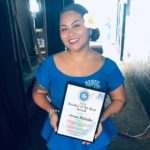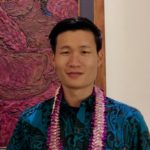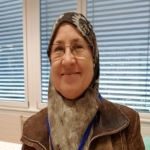Session Description
While Web 2.0 tools have been around for several years, these types of technology are still considered to be novel in most rural nations, such as American Samoa. There are a myriad of tools that can be used for educational purposes, but one goal is to determine if they can be used to promote collaboration, as this is a facet of most classroom instruction. Specifically, in American Samoa, one of the Department of Education’s objectives is to teach students to be more proficient in technology, and in order to do so, Web 2.0 tools need to be integrated efficiently.
Hence, this dissertation study explored the use of three Web 2.0 tools, Google Docs, Blogger, and Wikidot, to determine the influence they had while the students.
Presenter(s)
 Sabrina Suluai-Mahuka
Sabrina Suluai-Mahuka
University of Hawai‘i at Mānoa
Sabrina Suluai-Mahuka serves as a Secondary Education Teacher for the American Samoa Department of Education. For almost ten years now, Sabrina has taught English to English Language Learners from all over the island and averages about 100 students per academic year. In addition, Sabrina also acts as an advisor and lecturer for the University of Hawaii at Manoa PACMED program for the Pacific Region. In her role as PACMED instructor Sabrina facilitates tertiary courses with UH Manoa graduate students in American Samoa, Hawaii, and the Republic of Marshall Islands.
Sabrina earned the title of Nobel Educator of Distinction with the National Society of High School Scholars, bestowed membership with the Phi Lambda Theta Honor Society, and represented American Samoa at the 2019 Young Pacific Leaders program. Sabrina was a TEDx Speaker at the inaugural Pago Pago event where she emphasized mentorship for our youth through her published talk “Be That Person”. Simultaneously, Sabrina is the founder for the community service project, Finafinau, which was founded in 2017 and focuses on youth advocacy for the environment. In this capacity, she works with over 50 youth each year to coordinate coast clean ups, tree planting, and school outreach visits, with the hope to promote environmental conservation and resilience. This past March, Sabrina was the first American Samoan to win the Presidential Innovation Award for Environmental Educators from the US Environmental Protection Agency for all of Region 9. In addition, Sabrina was named the 2021 Territorial Teacher of the Year for American Samoa.

 Jin Ha Woo
Jin Ha Woo Kathleen O'Mara
Kathleen O'Mara Li Cheng-Cheng
Li Cheng-Cheng Reima Al-Jarf
Reima Al-Jarf Jerelyn Watanabe
Jerelyn Watanabe Darren Iwamoto
Darren Iwamoto Jason Yun Joon Lee
Jason Yun Joon Lee Michael Q Ceballos
Michael Q Ceballos